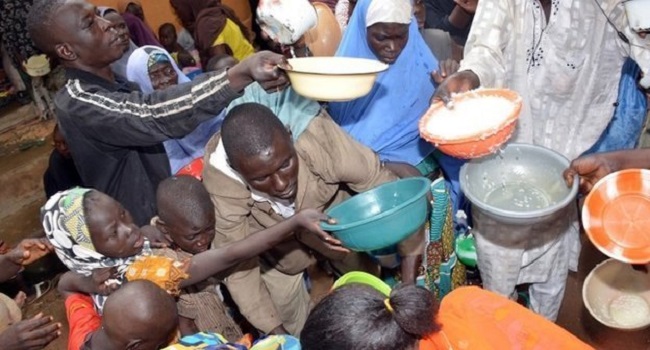Metro
Nigeria in another bad rating, now among 8 countries hosting world’s hungriest people

A United Nation’s report has again painted a horrible picture of life in Nigeria, describing it as one of the eight countries where two-thirds of world’s hungriest people reside.
The claim, which was contained in a Global Report on Food Crisis 2019 and released Wednesday in Brussels, revealed that no fewer than 113 million people experienced high levels of food insecurity in the world’s most severe food crises in 2018.
According to the report, the food crises were primarily driven by conflict and climate-related disasters.
Countries aside Nigeria, where people facing acute hunger reside according to the report are Afghanistan, the Democratic Republic of the Congo, Ethiopia, South Sudan, Sudan, Syria and Yemen.
The report said, “The worst food crises in 2018, in order of severity, were: Yemen, the Democratic Republic of the Congo, Afghanistan, Ethiopia, the Syrian Arab Republic, the Sudan, South Sudan and northern Nigeria.
“These eight countries accounted for two-thirds of the total number of people facing acute food insecurity – amounting to nearly 72 million people.”
The report further stated that short-term outlook of food insecurity for 2019 showed “Yemen, the Democratic Republic of the Congo, Afghanistan, Ethiopia, the Syrian Arab Republic, the Sudan, South Sudan and northern Nigeria are expected to remain among the world’s most severe food crises in 2019.
“Large segments of populations in most of these countries risk falling into Emergency (IPC/CH Phase 4) levels of acute food insecurity.”
The report also revealed that “in the 16 states of northern Nigeria and the Federal Capital Territory, the number of people in ‘Crisis’ and ‘Emergency’ decreased by 40 per cent between June and August 2017 and 2018 to 5.3 million.
“At the peak of the lean season three million were acutely food insecure in the three north-eastern states affected by the Boko Haram insurgency where protracted conflict and mass displacement disrupted agriculture, trade, markets and livelihoods, and pushed up food prices.”
According to Food and Agriculture Organisation (FAO)’s Director-General, José da Silva, in spite of a slight drop in 2018 in the number of people experiencing acute food insecurity, “the figure is still far too high.
“We must act at scale across the humanitarian-development-peace nexus to build the resilience of affected and vulnerable populations. To save lives, we also have to save livelihoods,” he said.
READ ALSO: Buhari accuses National Assembly of padding, declines assent to 8 bills
In his comment, World Food Programme Executive Director, David Beasley said, “While critical to saving lives and alleviating human suffering, humanitarian assistance does not address the root causes of food crises.”
Earlier, reports by Transparency International and others have also painted Nigeria as home to most poor people in the world.
Join the conversation
Support Ripples Nigeria, hold up solutions journalism
Balanced, fearless journalism driven by data comes at huge financial costs.
As a media platform, we hold leadership accountable and will not trade the right to press freedom and free speech for a piece of cake.
If you like what we do, and are ready to uphold solutions journalism, kindly donate to the Ripples Nigeria cause.
Your support would help to ensure that citizens and institutions continue to have free access to credible and reliable information for societal development.






















